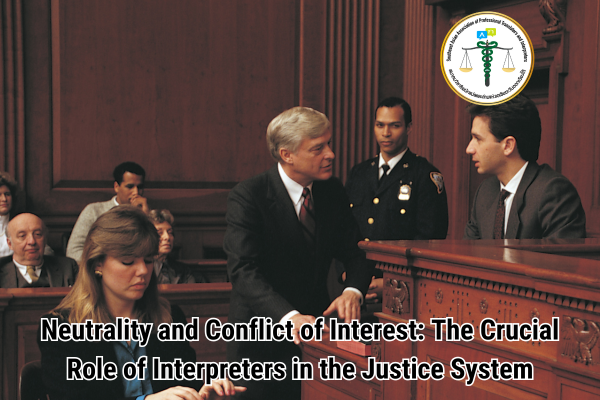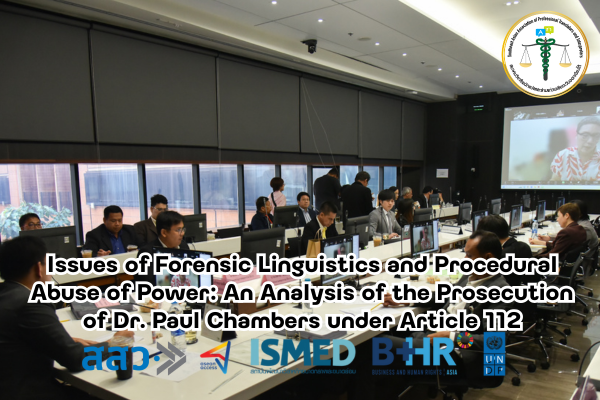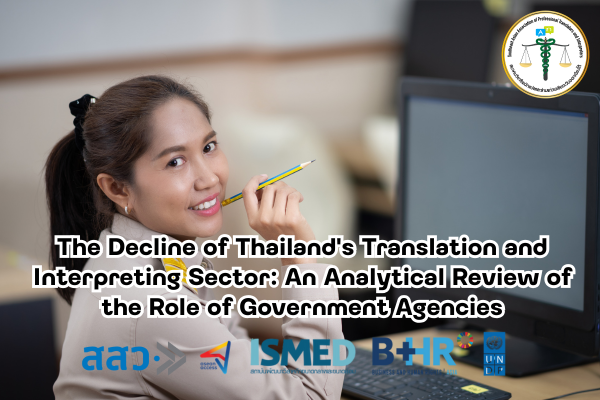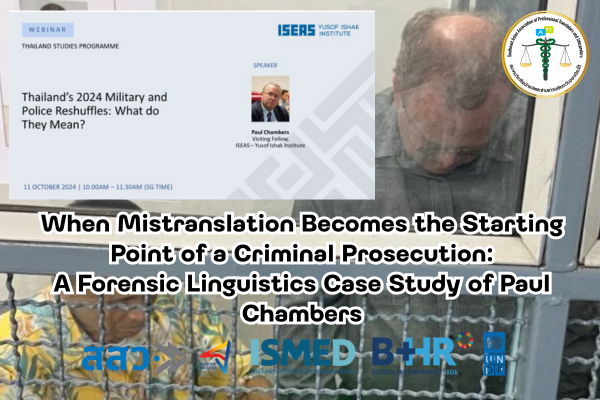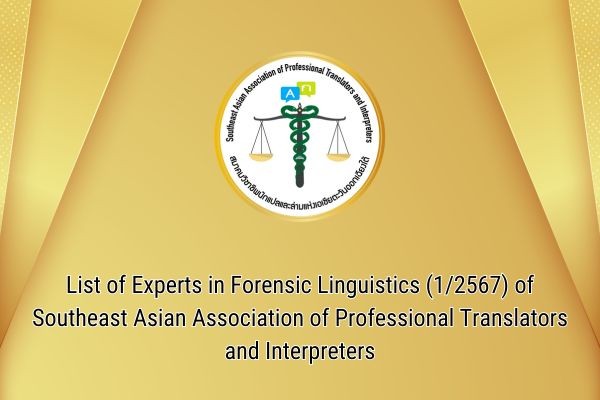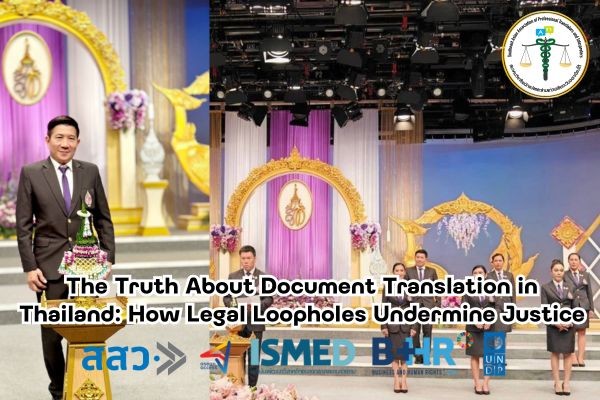The Truth About Document Translation in Thailand: How Legal Loopholes Undermine Justice
27 April 2025, Bangkok – Although Thailand has enacted clear laws and ministerial regulations governing document translation and translation certification, both public agencies and private sector actors often fail or deliberately choose not to comply. This practice creates significant opportunities for corruption, distorts factual accuracy, and seriously undermines the rule of law.
1. Non-Compliance with the Administrative Procedure Act B.E. 2539 (1996) (Amended 1997)
The Administrative Procedure Act explicitly requires that certified translations for use in government processes be performed and certified by recognized translators or certified translation verifiers, ensuring that translations are accurate, impartial, and reliable.
Nevertheless, in practice, many public agencies—including in the case of Dr. Paul Chambers—have:
- Not employed professional certified translators
- Not ensured certification was conducted in accordance with legal requirements
For example, the Third Army Area, responsible for filing the complaint against Dr. Chambers, failed to use professional translators and failed to have translations certified by authorized persons under the Act. This omission is not coincidental: certified translators are bound by professional ethics and impartiality, which may prevent them from adjusting translations to favor any particular party.
Similarly, some lawyers translate documents themselves and self-certify their translations, even though they do not have the legal authority to certify translations for official use. Such practices directly contravene the intent of the law, which seeks to preserve impartiality and protect the integrity of administrative documents.
2. The Role of Translation Shops and Translation Companies
Translation shops and translation companies, registered with the Department of Business Development under the Ministry of Commerce, are legally permitted to provide translation services. However:
- They are not legally authorized to certify translations for government use.
- They are also required to comply with the Administrative Procedure Act.
Despite this, it is common for translation companies to improperly certify documents, misrepresenting their authority and causing documents to lack the legal reliability required for administrative or judicial proceedings.
3. An Exception: Translations for the Ministry of Foreign Affairs
When translations are submitted for authentication by the Department of Consular Affairs at the Ministry of Foreign Affairs, there is currently no formal requirement specifying who must perform the translation. In this very specific context:
- Anyone may translate a document for submission.
However, the responsibility for the translation’s accuracy remains with the applicant, and improperly translated documents may later be rejected or cause legal complications abroad.
4. Certified Translators in the Private Sector
In the private sector, professional translation and translation certification are governed by standards set by the
- Southeast Asian Association of Professional Translators and Interpreters (SEAProTI).
SEAProTI formally certifies translators and translation verifiers, issuing professional licenses under its regulations. Although private entities are not bound by the same legal obligations as government agencies, best practice requires them to use certified professionals recognized by authoritative bodies to ensure transparency, reliability, and ethical compliance.
5. Consequences of Ignoring Laws and Professional Ethics
When public and private organizations deliberately ignore legal requirements and professional ethics, the consequences are severe:
- Opportunities for corruption multiply.
- Facts are distorted to favor specific interests.
- Trust in administrative and judicial processes erodes domestically and internationally.
Human rights violations occur, especially in cases involving freedom of expression, such as the Paul Chambers case, where mistranslation played a critical role in wrongful legal proceedings.
Conclusion
Translation and certification of documents are critical mechanisms for safeguarding fairness in administrative and judicial processes. Circumventing these mechanisms not only undermines the rule of law but also directly impacts human rights and the country’s credibility on the global stage.
All sectors must recognize that engaging properly certified translators, who are bound by law and professional codes of conduct, is not merely a formality but a crucial defense of justice itself.
SEAProTI’s certified translators, translation certification providers, and certified interpreters:
The Southeast Asian Association of Professional Translators and Interpreters (SEAProTI) has officially announced the criteria and qualifications for individuals to register as “Certified Translators,” “Translation Certification Providers,” and “Certified Interpreters” under the association’s regulations. These guidelines are detailed in Sections 9 and 10 of the Royal Thai Government Gazette, issued by the Secretariat of the Cabinet under the Office of the Prime Minister of the Kingdom of Thailand, dated July 25, 2024, Volume 141, Part 66 Ng, Page 100.
To read the full publication, visit: the Royal Thai Government Gazette
ความจริงเกี่ยวกับการแปลเอกสารในประเทศไทย: ช่องโหว่ทางกฎหมายที่บั่นทอนกระบวนการยุติธรรม
25 เมษายน 2568, กรุงเทพ – แม้ประเทศไทยจะมีพระราชบัญญัติและกฎกระทรวงที่กำหนดมาตรฐานเกี่ยวกับการแปลและการรับรองการแปลไว้อย่างชัดเจน แต่ในทางปฏิบัติกลับพบว่า ทั้งหน่วยงานราชการและภาคเอกชนจำนวนไม่น้อยละเลย หรือจงใจหลีกเลี่ยงการปฏิบัติตามกฎหมายเหล่านั้น เพื่อประโยชน์เฉพาะหน้า อันเป็นการเปิดช่องให้เกิดการทุจริต บิดเบือนข้อเท็จจริง และทำลายหลักนิติธรรมอย่างร้ายแรง
1. การไม่ปฏิบัติตามพระราชบัญญัติวิธีปฏิบัติราชการทางปกครอง พ.ศ. 2539 (แก้ไขปี 2540)
พระราชบัญญัตินี้กำหนดชัดเจนว่า การรับรองการแปลซึ่งจะนำไปใช้ในราชการ ต้องกระทำโดยผู้รับรองการแปลที่ได้รับการรับรองอย่างถูกต้องตามกฎหมาย เพื่อให้เอกสารแปลมีความน่าเชื่อถือ เป็นกลาง และสะท้อนข้อเท็จจริงอย่างถูกต้อง อย่างไรก็ตาม ในหลายกรณี รวมถึงคดี พอล เชมเบอร์ส พบว่า หน่วยงานราชการ เช่น กองทัพภาคที่ 3
- ไม่ใช้นักแปลมืออาชีพที่ได้รับการรับรอง
- ไม่ดำเนินการรับรองการแปลตามข้อกำหนดหรือพระราชบัญญัตินี้
ทั้งนี้ เนื่องจากนักแปลมืออาชีพมีหน้าที่รักษาความเป็นกลาง อาจไม่สามารถปรับเนื้อหาให้เป็นไปตามประโยชน์ของหน่วยงานได้ จึงเลือกใช้บุคคลที่ไม่มีสถานะนักแปลรับรอง เพื่อหลีกเลี่ยงข้อจำกัดทางจริยธรรมและกฎหมาย
เช่นเดียวกับทนายความบางราย ที่แปลเอกสารด้วยตนเองและลงนามรับรองเอง ทั้งที่ตามกฎหมาย ทนายความไม่มีอำนาจในการรับรองการแปลสำหรับการใช้งานในราชการ ซึ่งถือเป็นการละเมิดเจตนารมณ์ของกฎหมายที่ต้องการคุ้มครองความเป็นกลางของเอกสารแปล
2. บทบาทของร้านแปลและบริษัทแปล
ร้านแปลและบริษัทแปลที่จดทะเบียนกับกรมพัฒนาธุรกิจการค้า กระทรวงพาณิชย์ มีสิทธิให้บริการแปลเอกสารได้ แต่ ไม่มีสิทธิรับรองการแปล ตามกฎหมายราชการหรือพระราชบัญญัติวิธีปฏิบัติราชการทางปกครองนี้ เนื่องจาก
- ไม่มีการมอบอำนาจให้ร้านแปลหรือบริษัทเป็นผู้รับรองการแปลในกระบวนการราชการ
- ร้านแปลก็ต้องปฏิบัติตามพระราชบัญญัติวิธีปฏิบัติราชการทางปกครองนี้เช่นกัน
อย่างไรก็ตาม ความเข้าใจผิดและการละเลยข้อเท็จจริงนี้ยังคงแพร่หลาย ส่งผลให้ร้านแปลจำนวนมากรับรองเอกสารโดยไม่มีอำนาจตามกฎหมาย รองรับการใช้งานในราชการ ซึ่งอาจทำให้เอกสารขาดความน่าเชื่อถือและมีผลกระทบทางกฎหมายตามมา
3. ข้อยกเว้นเฉพาะ: เอกสารที่นำไปยื่นกรมการกงสุล
ในกรณีที่เอกสารแปลจะนำไปยื่นขอรับรอง (Legalized)ที่กรมการกงสุล กระทรวงการต่างประเทศ ปัจจุบันยังไม่มีข้อบังคับชัดเจนว่าผู้แปลต้องมีสถานะใด ดังนั้นจึงเปิดโอกาสให้
- ใครก็สามารถแปลเอกสารได้ (ในกรณีนี้เท่านั้น)
- แต่ผู้ยื่นจะต้องยอมรับความเสี่ยงในกรณีที่การแปลผิดพลาด หรือเอกสารไม่ผ่านการรับรองในขั้นตอนต่อไป เช่น การนำไปใช้ในต่างประเทศ
4. การรับรองการแปลในภาคเอกชน
สำหรับภาคเอกชน การแปลและการรับรองการแปลที่มีมาตรฐานสูงต้องดำเนินการโดย
- นักแปลรับรอง
- ผู้รับรองการแปล
ซึ่งได้รับการรับรองตามข้อบังคับของ สมาคมวิชาชีพนักแปลและล่ามแห่งเอเชียตะวันออกเฉียงใต้ (SEAProTI) โดยสมาคมเป็นองค์กรที่มีข้อบังคับรับรองสถานะนักแปลและผู้รับรองการแปลอย่างเป็นทางการในประเทศไทย
ข้อบังคับของสมาคมเป็นหนึ่งทางเลือกให้สังคม และเพื่อความโปร่งใส ความน่าเชื่อถือ และการเคารพสิทธิของคู่สัญญา ฝ่ายเอกชนก็ควรเลือกใช้ผู้ที่มีใบอนุญาตอย่างถูกต้องตามข้อบังคับวิชาชีพเช่นกัน
5. ผลกระทบจากการละเมิดกฎหมายและจริยธรรมวิชาชีพ
การที่หน่วยงานราชการและภาคเอกชนละเลย หรือจงใจไม่ปฏิบัติตามกฎหมายและหลักจริยธรรมการแปล ก่อให้เกิดผลกระทบอย่างรุนแรง ได้แก่
- เปิดช่องให้มีการบิดเบือนข้อเท็จจริงและข้อมูลในเอกสาร
- เพิ่มโอกาสในการทุจริตและบิดเบือนกระบวนการยุติธรรม
- ลดความน่าเชื่อถือของหน่วยงานที่เกี่ยวข้องทั้งในและต่างประเทศ
- ละเมิดสิทธิมนุษยชน โดยเฉพาะในคดีที่เกี่ยวข้องกับเสรีภาพ เช่น คดีของพอล เชมเบอร์ส ซึ่งกระบวนการแปลที่ไม่มีมาตรฐานมีบทบาทสำคัญในการนำไปสู่การดำเนินคดีอย่างไม่เป็นธรรม
สรุป
การแปลเอกสารและการรับรองการแปลเป็นหัวใจสำคัญในการคุ้มครองความเป็นธรรมในกระบวนการราชการและกระบวนการยุติธรรม การละเลยกฎหมาย หรือการใช้ช่องโหว่ทางกฎหมายเพื่อประโยชน์ฝ่ายเดียว ไม่เพียงแต่บ่อนทำลายหลักนิติธรรม แต่ยังส่งผลกระทบโดยตรงต่อสิทธิมนุษยชนและความน่าเชื่อถือของประเทศในสายตาสังคมโลก
ทุกภาคส่วนควรตระหนักว่า การใช้บริการนักแปลรับรองที่ได้รับการรับรองตามมาตรฐานกฎหมายและจริยธรรมวิชาชีพ ไม่ใช่เพียงเรื่องของการปฏิบัติตามระเบียบ แต่เป็นการปกป้องความยุติธรรมในสังคมโดยตรง
เกี่ยวกับนักแปลรับรอง ผู้รับรองการแปล และล่ามรับรองของสมาคมวิชาชีพนักแปลและล่ามแห่งเอเชียตะวันออกเฉียงใต้
สมาคมวิชาชีพนักแปลและล่ามแห่งเอเชียตะวันออกเฉียงใต้ (SEAProTI) ได้ประกาศหลักเกณฑ์และคุณสมบัติผู้ที่ขึ้นทะเบียนเป็น “นักแปลรับรอง (Certified Translators) และผู้รับรองการแปล (Translation Certification Providers) และล่ามรับรอง (Certified Interpreters)” ของสมาคม หมวดที่ 9 และหมวดที่ 10 ในราชกิจจานุเบกษา ของสำนักเลขาธิการคณะรัฐมนตรี ในสำนักนายกรัฐมนตรี แห่งราชอาณาจักรไทย ลงวันที่ 25 ก.ค. 2567 เล่มที่ 141 ตอนที่ 66 ง หน้า 100 อ่านฉบับเต็มได้ที่: นักแปลรับรอง ผู้รับรองการแปล และล่ามรับรอง



